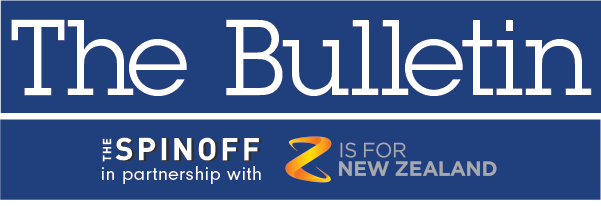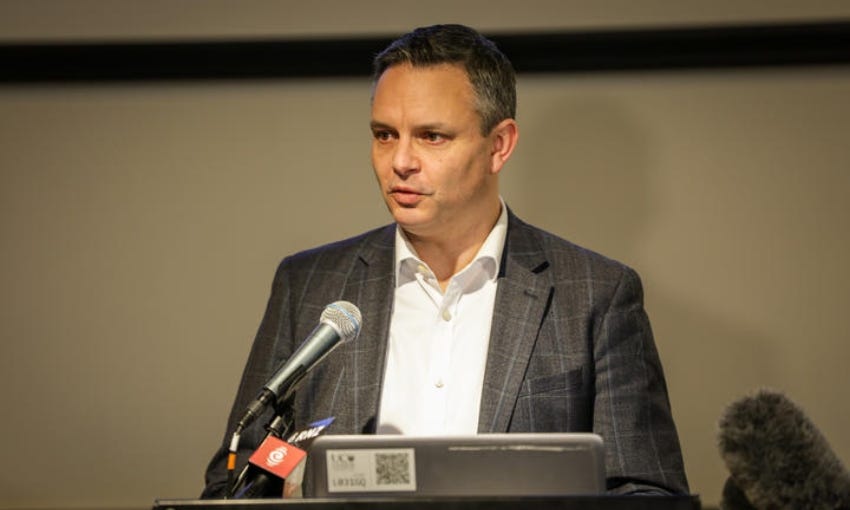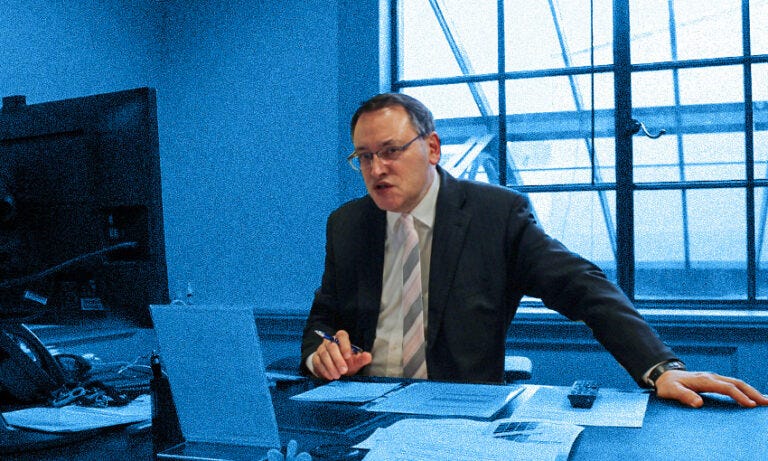Green school controversy drags on and on
What initially seemed like a small story has blown up into a massive saga for Green co-leader James Shaw

Good morning and welcome to The Bulletin for Wednesday 2 September, by Alex Braae for The Spinoff. Presented in partnership with Z Energy.
In today’s edition: Green school controversy drags on for James Shaw, head of volunteer firefighters association being investigated, and wharfies speak out after worker death.

Image: Green party co-leader James Shaw (Radio NZ, Nate McKinnon)
I'll be honest, I really thought this story would be basically wrapped up by the weekend. And yet somehow it's Wednesday, and it's still in the news – and possibly even getting worse for all involved. I'm talking of course about the so-called Green School in Taranaki, a private provider that was given a grant of $11.7 million to redevelop their facilities – which may now be more like a loan. Even though it went against the party's policy and kaupapa around private schools, and even though a fair few state schools were annoyed about not getting comparative money for shovel ready projects, it has all turned into one of those mind-bendingly weird yarns that just keeps going.
Yesterday's developments were arguably the most dramatic. As our live updates (scroll down, busy day) reported, Green co-leader James Shaw made a public apology to all and sundry for supporting the project. "I apologise to parents, to teachers and unions. I apologise to Green Party members who… have felt demoralised by this decision. I apologise to the schools in Taranaki who quite rightfully want the best for their children. And I want you to know, all of you, that I have listened to your concerns,” Shaw said. He also pointed out that others had been in favour of the spending on the shovel-ready, job creating project, including the mayor of New Plymouth.
Just how hard did Shaw push for the funding to go ahead? As Newshub's Tova O'Brien reported, an email from his office regarding the whole $3 billion package included the following line – "Minister Shaw won't sign this briefing until the Green School in Taranaki is incorporated." It also said that Shaw had discussed the briefing with education minister Chris Hipkins, who had previously said he hadn't been all that keen on the idea, but had backed down in the face of Shaw pushing for it. Like it or not, it is becoming something of an albatross for the Green co-leader, and it's all a bit weird to have him be clearly in favour at first, only to then turn around and say he now wouldn't support it.
Want more weirdness with this story? A few other angles ended up popping out. One was the New Plymouth Labour candidate Glen Bennett, who Radio NZ's Jo Moir said changed his initially supportive position to one of bitter opposition within four days. There was the strange spectacle of National railing against funding for a private school, despite being in favour of that during their last term of government. And as for the school itself, Newshub's Anna Bracewell-Worrell had a funny story about it hosting an event run by a conspiracy theorist couple with some rather out-there views. Given how much bizarre drama we've all got out of this story, you'd have to say $11.7 million is a bargain.
I'm heading back out on the road again next week for the election campaign. Thanks to Jucy and Z Energy, I'll once again be trying to get to as many places outside of Auckland as possible. So if you've got an event, debate or election story you reckon is worth covering, please send some info through to thebulletin@thespinoff.co.nz. And if you sent in info about events before the campaign got delayed, I'd love an update about whether it's still going ahead, and with what sort of conditions in place to manage at level two.
Two complaints of sexual harassment and bullying have made against the boss of the volunteer firefighters association, reports Clare Sziranyi of Radio NZ. A QC has been brought in to investigate the complaints which have been brought against CEO Bill Butzbach. The complaints relate to incidents that allegedly took place several years ago. One refers to an alleged "hazing incident" – and to quote the story – "the other complainant wants the terms of reference for the inquiry to "include sexual assault, sexual harassment, unwanted sexual advances, bullying, harassment and victimisation." RNZ might have put the first story out, but later in the day Imogen Wells from One News put further details on the record.
The union for port workers says twelve hour graveyard shifts are too long, after the death of a worker in Auckland, reports Radio NZ. They say that the nature of the work – in which simple mistakes could be extremely dangerous – make such work arrangements "a recipe for disaster." Further complaints have been reported by Stuff, in which a former wharfie said he narrowly avoided the same fate as the worker who was killed. The port itself says an investigation is currently underway, and cannot comment at this stage.
Some very useful polling on the popular mandate for lockdowns: The NZ Herald (paywalled) reports the last round of restrictions was overwhelmingly supported by the public, even among Aucklanders who were at level three. In fact, on the extension made last week to bring level three up to Sunday night, 62% of respondents said it was an appropriate response, and a further 19% said it should have been extended further. Funnily enough, Auckland's lockdown was even more popular in the rest of the country. The numbers are pretty staggering, and will be worth bearing in mind this weekend for the next round of protests against future lockdowns.
With those in rest homes significantly more vulnerable to Covid-19 than everyone else, there is confusion about what alert level 2.5 means, reports Stewart Sowman-Lund. For example, Bupa homes opened on Monday before closing again, after taking in more advice from the government, with the PM saying rest homes were being kept on "very strict settings." However, they weren't clear on what those settings actually were. When asked, health minister Chris Hipkins encouraged rest homes to err on the side of caution.
A long running legal battle over religious education in schools has come to an end, reports Stuff. The court case was dropped after an 'opt-in' clause was added to the Education and Training Act, meaning that explicit parental consent would be required before kids could take part in RE. Interestingly, the decision to drop the court case has led to something of a tactical split within the Secular Education Network, with one group basically saying a win is a win, and another saying that the movement had much wider goals around other aspects of religious culture in the school system.
Got some feedback about The Bulletin, or anything in the news?
Drop us a line at thebulletin@thespinoff.co.nz

Right now on The Spinoff: Justin Giovannetti meets Dr Shane Reti, and has produced a remarkable and wide ranging interview about his career and motivations to be in politics. Jenny Te Paa-Daniels writes about the fearless Pacific advocacy of former French Polynesia president Oscar Temaru. Alice Snedden's Bad News looks at the issue of prisoner voting rights. Leonie Hayden writes about how mentoring is a small act that can make a huge difference in the life of a young person. Justin Latif writes about how Covid-19 is upending traditions around grief among Māori and Pacific people. Rebecca Reider writes about ways to convince skeptics that cannabis legalisation would be a good idea. DOC’s threatened species ambassador Erica Wilkinson writes about ballooning tahr numbers, and why a cull is necessary. Duncan Greive writes about a major new NZ on Air survey about what the country is watching and listening to, and what it means for media platforms. And Josie Adams meets the new Australia-NZ director of music for social media platform TikTok.
Before sharing this feature, let me just say something quickly about aspects of the framing in it. Published in the Guardian, it's about the remarkable refugee intake made by Germany from 2015 onwards, and the real contribution many of those people are now starting to make in their new home country. My slight concern is around the idea that refugee intakes are good because people from those backgrounds make themselves useful, rather than seeing refugee intakes as inherently morally good decisions. But you can't deny that a lot of these people have made the most of their new lives, and that's also very cool to see, even if there have been pressures on the wider system. Here's an excerpt:
Hallak, an exceptionally motivated student with high social aptitude, is not representative of all the 1.7 million people who applied for asylum in Germany between 2015 and 2019, making it the country with the fifth highest population of refugees in the world. Some of those with whom he trekked through Turkey and across the Mediterranean, he says, haven’t picked up more than a few words and “just chill”.
But Hallak is not a complete outlier either. More than 10,000 people who arrived in Germany as refugees since 2015 have mastered the language sufficiently to enrol at a German university. More than half of those who came are in work and pay taxes. Among refugee children and teenagers, more than 80% say they have a strong sense of belonging to their German schools and feel liked by their peers.
In sport, a wild story about life as a pro rugby player in Russia from a brand new sports media platform. After the Whistle has published a memoir of sorts from colourful rugby character Marty Banks, who spent five months playing for a mafia-connected club in the city of Krasnoyarsk, Siberia. It's fair to say he had an interesting time of it all.
That's it for The Bulletin. If you want to support the work we do at The Spinoff, please check out our membership programme




